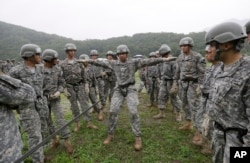South Korea is taking increased security measures to prevent a potential attack from the Islamic State (IS), after the country's intelligence agency warned that the terrorist group may be targeting both U.S. military installations and civilians on the Korean peninsula.
The South Korean National Intelligence Service (NIS) Sunday said that IS released a list of potential terrorist targets that include the locations of 77 Air Force installations belonging to the United States and North Atlantic Treaty Organization (NATO) in 21 countries, and also important individuals associated with them.
Four of the military installations on the list of IS targets are in South Korea. The NIS reported the list included detailed geographical coordinates and satellite images from Google Maps of U.S. Air Force bases in Osan, in Gyeonggi and Gunsan in North Jeolla.
Enhanced security measures
South Korea's Joint Chiefs of Staff said Monday Seoul is sharing intelligence and closely coordinating with U.S. military officials on the potential terrorist treat.
"In order to strengthen the defense of the bases of the USFK (U.S. Forces in Korea), we will provide support if they request through cooperation with the Combined Forces Command," said Korean Joint Chiefs of Staff spokesman Jeon Ha-gyu.
A South Korean citizen, who works for a welfare organization, was reportedly also on the IS "kill list" of over 8,000 individuals around the world that was sent out earlier this month by telegram and messaging services.
The South Korean National police said it is providing the targeted Korean citizen with police protection and increasing regional patrols to prevent any terrorist attack.
Prime Minister Hwang Kyo-ahn also said Monday that the country's counterterrorism center will strengthen related investigations and take every possible step to safeguard the general public.
While South Korea may be taking the terrorist threat seriously, regional security analysts say it will be very difficult for Islamic extremists to carry out an attack in Northeast Asia.
"The two Koreas, Japan and China, they're strong states and their police forces and their intelligence services, their capacity and ability to track and monitor any terrorist group is quite strong," said Daniel Pinkston, a lecturer in international relations with Troy University in Seoul.
Strict immigration and gun control
In addition to strong security forces, South Korea also has in place strong restrictions on gun control and immigration.
In the recent terrorist attack in Orlando, Florida, an American born son of Afghan immigrants and an avowed IS supporter killed 49 people using a military grade assault rifle.
The U.S. Democratic presidential candidate Hillary Clinton has in response called for banning suspected terrorists from buying guns. Republican nominee Donald Trump has called for suspending immigration from regions where terrorist groups operate. Both positions are controversial among the American electorate. Many gun owners oppose any restriction to their constitutional right to bear arms. And even some leaders within Trump's own party oppose an immigration ban saying it would alienate moderate Muslim supporters.
But in South Korea there is no gun debate. Only authorized government personal are allowed to own and carry guns.
South Korea and Japan have also been accused of restricting immigration from conflict ridden Muslim countries. The human rights organization Amnesty International Amnesty in 2016 criticized South Korea and Japan (as well as Russia and Singapore) as high-income nations that offered zero resettlement places for Syrian refugees.
In contrast North Korean defectors that come South are welcome without restriction and are not considered asylum seekers. They are South Korean citizens by law.
Anti-terrorism law
The NIS noted that South Korea has deported 50 people linked to terrorist groups in the last year.
In 2015 an alleged Indonesian a member of a terrorist group affiliated with IS called Al Nusra spent eight months in prison on terrorism charges. Police said the man entered the country on a false passport, possessed an illegal rifle in his home, and his bank account was linked to an Islamic extremist group.
The NIS noted that the counterterrorism center to be used to monitor terrorist groups was recently authorized under the passage of the Anti-Terrorism law by the National Assembly in March.
The Anti-Terrorism law was opposed by some civic groups that say it is too invasive and could be too easily abused to restrict peaceful dissent.
Youmi Kim in Seoul contributed to this report.






